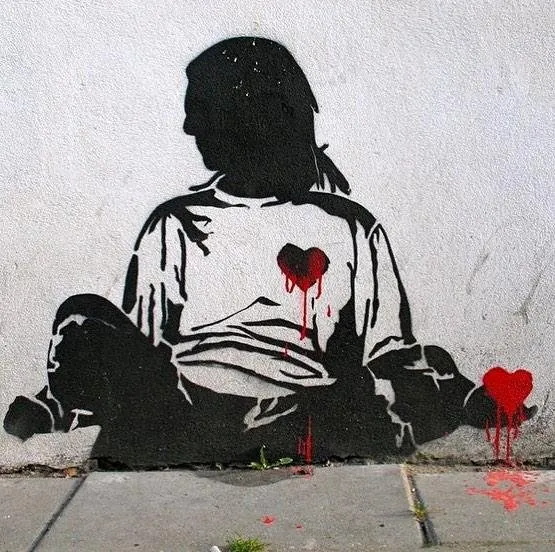 )
)"I hold it true, whate'er befall;
I feel it when I sorrow most;
'Tis better to have loved and lost
Than never to have loved at all."
Tennyson wrote these lines as he grieved over the loss of his friend who died suddenly in 1833. Life is 'sorrow touched with joy', he concedes, and indeed, this is the essence of this question - that love and loss walk hand in hand, and that without grief and loss and pain, love and joy is not as sweet.
It's the contract that we all have with life - that we may live and love, but we must also grow old and die, and those we love will die too, inevitably. I am currently teaching David Malouf's 'Ransom' to teenagers, who have yet to truly experience romantic love, yet many have already known loss and grief of parents, brothers and grandparents. It is hard to teach some scenes as one of the girls in the class just lost her brother to suicide. It breaks my heart, and I am conscious of her in particular as I talk through King Priam pleading to the warrior Achilles to give him the body of his son. He appeals to Achilles pity and compassion, reminding him that it behooves all men to treat each other with kindness because we all love, and we all feel loss, and we all will grow old and die - that is the price of being mortal:

How tragic it is for the young warrior Achilles to mourn his friend Patroclus. It's for this reason he straps his friend's killer to the back of his chariot and drags the corpse for days around the walls of Troy whilst everyone watches in horror. Did Achilles wish he had never loved him at all? Did he ever have another love like it again? Had the story ended differently, and had he not been shot in the heel by Paris, would he have let himself love again, given the grief he had gone through?
Oh Achilles, the price of love is grief, but we would pay it gladly, time and time again.
I ask Jamie the question, and, playing the devil's advocate, he says 'of course it's better not to have loved, because then you don't know what you are missing'. But the heart yearns, of course, or we would never have connected and met. And all the lovers that paved the way for this relationship of 15 years would never had happened, never taught us all those lessons. There's ones we regret, of course, the ones we still carry guilt over, or wish we'd never loved, because we still carry those wounds. I think of those that get married knowing that one will die within the year. I think of my Granddad dying two years after my Grandma after sixty years together, of a broken heart. He never wished he had never loved her, only that he'd never lost her. My mother found a letter he'd written to her after her death in shaky arthritic hands, pining for his lost love but never, ever regretting her at all. I watch my mother with my father's head in her lap, sick from chemo before the remission. She never regretted having loved him, faced with this prospect of losing him. Nor has anyone who had ever had a brother, a son, a child every regretted the presence of them in their lives, despite the ravages of pain that Tennyson spoke of following his friend's death.
But I've seen the damage that love can do, with a boyfriend who could never get over his mother's suicide when he was 13. I tried to heal him, but couldn't (oh, that need of woman to fix broken men!). That loss was insurmountable. He became the wound he was forced to carry, without the mechanism to cope with it - no counselling, no understanding from his father about how to fix this lonely boy who believed for most of his life that he had done something wrong for her to leave like that. Sometimes love and pain are sharp indeed.
If I think of this in terms of lovers, how blessed I am to have loved and lost. They come to me in dreams, sometimes, like far off echoes of beautiful sunsets or thunderstorms. The one who twirled his finger on the small of my back and told me that I was beautiful when I needed it most. The one who made me realise I could be friends with men as well as lovers. The one that made me see we could be lovers as well as friends. The girlfriends who became lovers. The lovers that became girlfriends. The one that lasted one night on the streets of Prague on a night of absinthe. The one I left in York with a broken heart whilst I followed another (that was J, my one and only, who I am still with now, in love) and the one who wrote a song about me and busked it on the steps of the library in Berlin. The one who sold my camera to fly home when he was done with me. The one who talked to hours to me on the telephone but stood me up when it came to meet, terrified that I would reject him. I am so glad I loved them all, because I did, with all my heart, as I do with all the beings that enter my life in such tender ways.
What lips my lips have kissed, and where, and why,
I have forgotten, and what arms have lain
Under my head till morning; but the rain
Is full of ghosts tonight, that tap and sigh
the glass and listen for reply,
And in my heart there stirs a quiet pain
For unremembered lads that not again
Will turn to me at midnight with a cry.
"What my lips have kissed, and where, and why..." by Edna St. Vincent Millay.
I have heard so many people say that they will never love again, or never leave themselves open to a relationship or to love, because it hurts too much. It's better to not go there, they say. To not love. I want to cry at them that it's what makes them human - without love, we lose our entire humanity. Of course we risk pain, but it is the cost, the contract we make with life.
Wilfred Owen wrote that men can be happy if they 'let their veins run cold' because they have lost all feeling and no 'compassion fleers, or makes their feet sore on the alleys cobbled with their brothers'. He wonders at the men at war who can 'laugh amongst the dying, unconcerned'. He wrote that 'some cease feeling, even themselves or for themselves.' and in this was tragedy indeed because:
By choice they made themselves immune
To pity and whatever moans in man
Before the last sea and the hapless stars;
Whatever mourns when many leave these shores;
Whatever shares
The eternal reciprocity of tears.
- Wilfred Owen, Insensibility
That is, because they have been so cauterised by loss, that they have lost the power to love, and in doing so, lose their humanity entire.
Because it is in our humanity to love - an essential human-ness.
It is far more human to have loved, and lost, than to have never loved at all. Or to have lost, and loved again, and lost again.
Without that fee being paid in advance, the world will not come to us.
What do you think? I'd love to know. Drop me a comment below.
Thanks @mountainjewel for coming up with this gem, and thanks @ecotrain and all it's passengers for engaging in such wonderful questions. You inspire me so much, all of you.
https://gateway.ipfs.io/ipfs/QmU9f4FK9j91cnUGYk9hnMXuYdAFcnF6ekkpXZ5DfiByfG


If you're a supporter of all things natural healing, you might like to read our introductory post here. We'd also love to welcome you on Discord here!!



